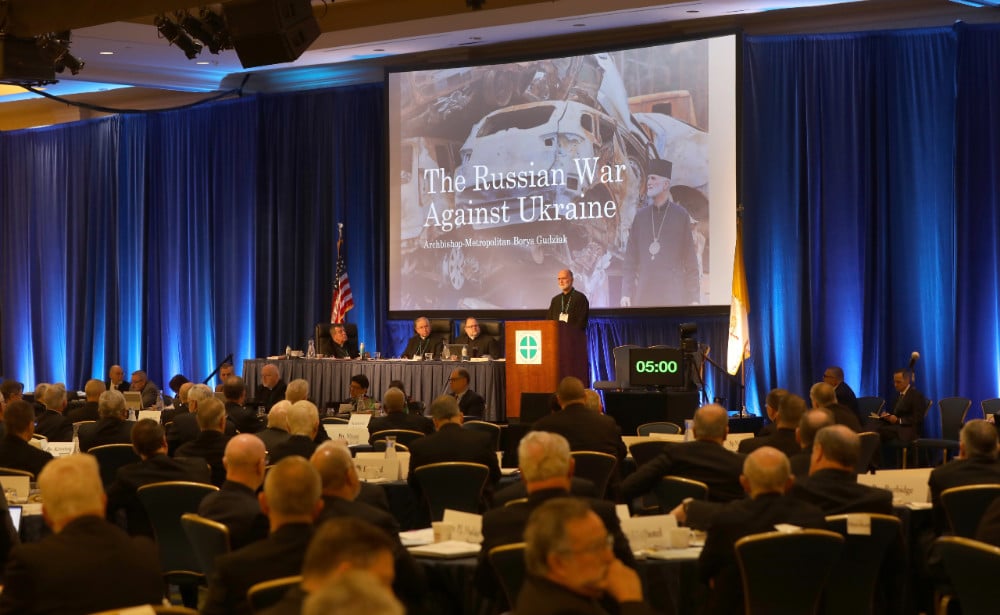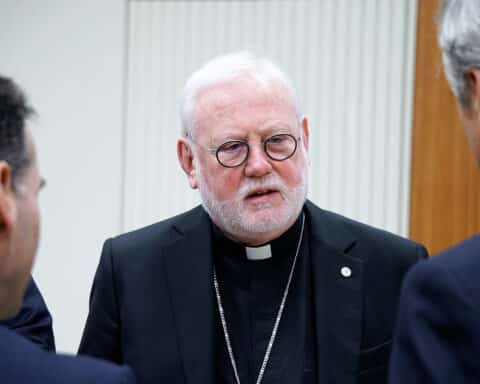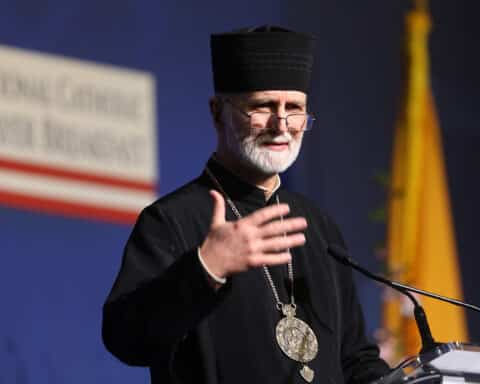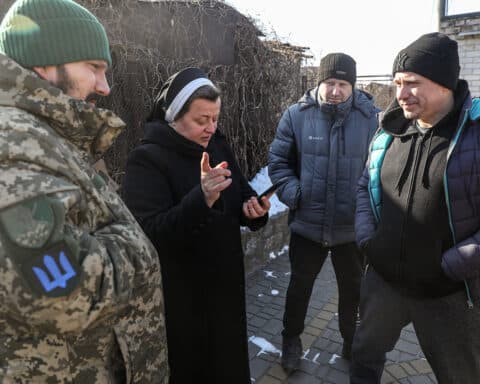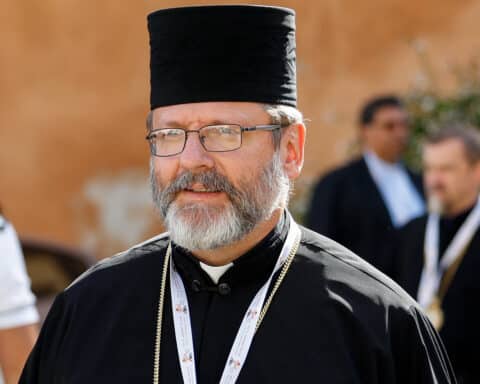With much on the agenda for the second general session of the U.S. bishops’ fall assembly in Baltimore, two key discussions arose that touch on the lives of every Catholic.
The war in Ukraine
“Yesterday morning at the Divine Liturgy, we had a great veneration of the Gospel book with incense, and the fire alarm went off,” began Archbishop Borys Gudziak, Metropolitan Archbishop of the Archeparchy of Philadelphia of the Ukrainian Greek Catholic Church. The bishops’ gentle laughter turned to sober silence as Archbishop Gudziak continued: “It was similar to the alarms that go off in Ukraine daily, sometimes a few times a day as air raid warnings.”
“This is what Ukraine looks like,” Metropolitan Gudziak said as he gestured to the rubble depicted on slides behind him. The archbishop shared that more than 44-million square meters of Ukrainian buildings have been damaged, amounting to more than $127 billion of infrastructure damage; 2,768 schools and educational institutions have been damaged, and 337 have been destroyed.
The humanitarian crisis continues to grow beyond the physical damage of the country, as more than 7.7 million Ukrainian refugees have crossed from Ukraine to Europe, while another 6,243,000 people have been displaced internally. “We saw how Poland received 4 million refugees, and nobody was in refugee camps; they were in homes,” said Archbishop Gudziak. Declaring the Russian attack a genocide, Archbishop Gudziak pleaded for his brother bishops to commit to each welcoming one family to the U.S.
Recognizing the past generosity of the American Church to Ukrainian Catholics, the archbishop appealed for further support and invited his brother bishops to join him on a future humanitarian trip to visit Ukraine.
“Today, the leadership of the Ukrainian Catholic University was laughing, people are singing,” the archbishop said, referring to a phone call he had with university community members yesterday morning. “They are like the youths in that furnace in Babylon, he said. “They trust in life, they trust in truth, they trust in dignity, solidarity, subsidiarity and the common good.”
Faithful Citizenship
The U.S. bishops overwhelmingly voted, with 205 votes, to reissue the 2007 instruction “Forming Consciences for Faithful Citizenship” in 2023, ahead of the 2024 presidential election. The bishops will not substantively change the document, but they will append a new introductory note and add supplemental materials.
Discussion around the document included concerns about whether or not the document really reaches the faithful, but debate on the floor focused largely on concerns about whether or not it adequately conforms to the themes of Pope Francis’ pontificate in order to be reissued before the election.
During the bishops’ consideration of the document, Bishop John Stowe of Lexington, Kentucky, was the first to comment. He stated that “we’re issuing a 2007 document” suggesting that such an action seems out of step since “we have a different pope” and “so much of the context has changed.”
Cardinal Robert McElroy of San Diego took to the floor to say that attention must be paid “to the crisis of democracy we’ve been experiencing.” The cardinal insisted, “Our people are uneasy about this, and we must speak to this question in a nonpartisan way, in an elevating way, in a way which comes from our tradition.”
Cardinal McElroy’s comments touched on the concerns of partisanship that are often found at the intersection of religious faith and civil affairs. Archbishop Paul Coakley of Oklahoma City told reporters, “Depending on what issue people are interested in, some people may say that we’re red, some that we’re blue, some people will say that we’re Republican, some that we’re Democrat.” However, he insisted, “But we would like to bear witness to our values in a way that transcends the partisanship that is so common in our culture and our civil discourse.”
Archbishop Coakley noted the timeless character of the moral principles that inform faithful Catholic voters as they act according to conscience: “I think the introductory notes, the footnotes, the videos, the various other supplements and ancillary materials will help people to recognize that this is a document that is applicable to the challenges that we’re facing today.”
Father Patrick Briscoe, OP, is editor of Our Sunday Visitor. Follow him on Twitter @PatrickMaryOP.

